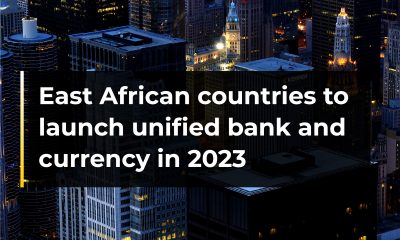FEATURED
Reimagining Finance in Africa: How Crypto, AI, & Machine Learning can Change the Narrative

In the heart of Africa, a traditional transformation is shaking the foundations of the financial landscape, signaling a departure from established norms towards an era defined by disruption, accessibility, and empowerment.
No longer are traditional banking systems and financial institutions solely responsible for steering economic progress.
The African continent stands at the precipice of change, as the fusion of revolutionary technologies such as cryptocurrency, artificial intelligence (AI), and machine learning reshapes the narrative, presenting a tapestry of uncharted possibilities.
During the Blockchain Vibes East Africa event, Elsie Godwin, co-founder of Cashwise and session host, along with Tola Joseph, founder of Crypto Masterclass, and Ignace Turatinze, Co-CEO of Paying Tone, engaged in a discussion about the evolution of finance on the continent. They emphasized the significant roles that crypto, AI, and machine learning play in its growth.
Tola began by explaining the shift from traditional paper money to digital currencies like cryptocurrencies in African finance and payment systems.
He also highlighted the advantages of using cryptocurrencies, such as its permissionless nature and user-friendly interface.
Tola further discussed the convenience of utilizing stablecoin such as USDT, which enables seamless global travel without the hassle of currency exchange or the need for physical USD.
He emphasized the importance of embracing the innovative possibilities that arise with the evolution of money and fintech in Africa.
From centralization to decentralization
Ignace highlighted the necessity for finance to evolve and become more decentralized in Africa. He emphasized that this is due to the challenges Africans face when accessing finance, particularly for micro-lending purposes.
As a Fintech entrepreneur, Ignace stressed the importance of leveraging available technologies and urged various stakeholders in the industry to reconsider their business models. Simplifying processes for customers should be the primary focus.
Drawing parallels with Google’s predictive capabilities, Ignace proposed applying similar principles in the financial sector. Ultimately, he urged the finance industry to keep pace with advancements seen in other sectors such as social media and e-commerce.
Easy exchange, AI, and machine learning
Expanding on the topic of changing payment systems in Africa, Tola emphasized the need for a protocol that facilitates seamless currency exchange and spending across different African countries.
By sharing his personal experience of using digital payment methods and virtual cards instead of relying on physical cash or ATMs, he highlighted the importance of modernizing payment and remittance processes in Africa.
Ignace, referencing Amazon’s use of AI and machine learning as an example, pointed out their potential to revolutionize the finance sector. Real-time decision-making capabilities could enable instant credit ranking and risk assessment for micro-lending, while automation could streamline loan recovery processes and improve fund management for lenders.
Furthermore, AI’s ability to analyze user patterns and predict future financial needs could assist lenders in planning and preparing for upcoming demands more efficiently.
Read also; McDonald’s Celebrates 40 with Metaverse project, McNuggets















1 Comment